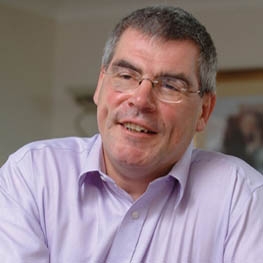‘The College needs to support GPs to do our job better’

I am delighted to be one of the four candidates for president of the RCGP. This election gives College members the ability to exercise their right to vote and I hope that they will take the opportunity.
During the last 30 years, I have undertaken roles at local, Scottish and UK levels. I have always believed in the need for a strong College which complements the role of colleagues in the General Practitioners Committee of the BMA.
General practice is still seen by many colleagues in other specialties as some sort of second class medicine. I strongly refute this. I believe the complex role of the generalist family doctor is hugely undervalued – by colleagues, by NHS management, by politicians and even sometimes by ourselves. We must emphasise our role as the key diagnosticians within the NHS, dealing with undifferentiated illness.
We have a unique ability to move from a child with an eating disorder, to a 90-year-old with diabetes and dementia, to a 30-year-old being bullied at work. We move smoothly between the domains of physical, psychological and social – almost with such ease that we make it look easy. But we all know it isn’t.
My prime reason for standing, therefore, is to promote our role: to ensure that we believe in our crucial importance to patients at an individual level but also to the survival of the NHS. The NHS would collapse without us.
Some non-members and, indeed, members still do not fully understand the difference between the roles of president and chair of Council (currently Dr Maureen Baker). It is an important distinction, as the chair is responsible for policy and professional issues guided by Council. The president is the titular head – much more of an ambassadorial and ceremonial role. There is, however, a role in promoting policy values, in particular generalism and professionalism.
In order for this to happen, the College needs to be perceived as more relevant to every day general practice, supporting each of us to do our job better. We have improved what we offer to members, but we can and must do more. I will ensure that we look at the needs of the membership at all stages of their careers and how we can make the College more relevant and meaningful, especially to newer members. I will actively promote a more consistent approach to provision of education across the faculties and encourage further development our on-line learning offer.
I intend focussing particularly on supporting the values and aspirations of younger colleagues. I was privileged to benefit from this kind of initiative myself when a new member. To take this forward, I will seek external funding for a First5 president’s leadership circle and encourage each faculty to send a participant. In addition, I will ensure that the needs of younger GPs are kept in the forefront of whatever we do.
Local faculties, the cornerstones of the College, can feel disconnected from the College’s central functions. To improve this, I would develop a provosts’ network. The purpose of this would be to strengthen connections and ultimately improve local services for members.
UK general practice is held in high esteem worldwide. We are one of the leaders in the world, if not the world leader. Yet our International efforts are fairly low key and have minimal impact. The College and its members have not seen this as important. Post-Ebola there will be a need for the development of primary care in sub-saharan Africa. I believe the College should be involved and leading such work and I will lead an external appeal to find funding to drive this forward.
My vision for our College is to see almost every GP in the UK over the next decade be a member or fellow. I am keen that we recognise the contribution of all our members to the care of patients.
Our current criteria for fellowship make it more difficult to achieve if you are principally a front line GP. This is the main purpose of general practice – it is what we are trained for and what our patients appreciate day in, day out. I will lead a review of fellowship criteria to give us more opportunities to celebrate what we do best.
Dr Colin Hunter is a GP in Westhill, Aberdeenshire, and chair of the RCGP’s trustee board. Dr Hunter recently stood down as chair of the NICE QOF advisory committee.
Pulse October survey
Take our July 2025 survey to potentially win £1.000 worth of tokens











